Just when I think life can’t get any more glam, here I am talking about my experience with cataract surgery! I spoke about it on Instagram a few days ago in the event that it would help a couple of people. And I’ve gotten so many messages from people in the same boat. I thought it was hard to find blog posts or videos with patients’ experience, and after finding a couple of videos on YouTube, my mind was put at ease. Hopefully this post will help answer any questions you might have if you have cataract surgery coming up.
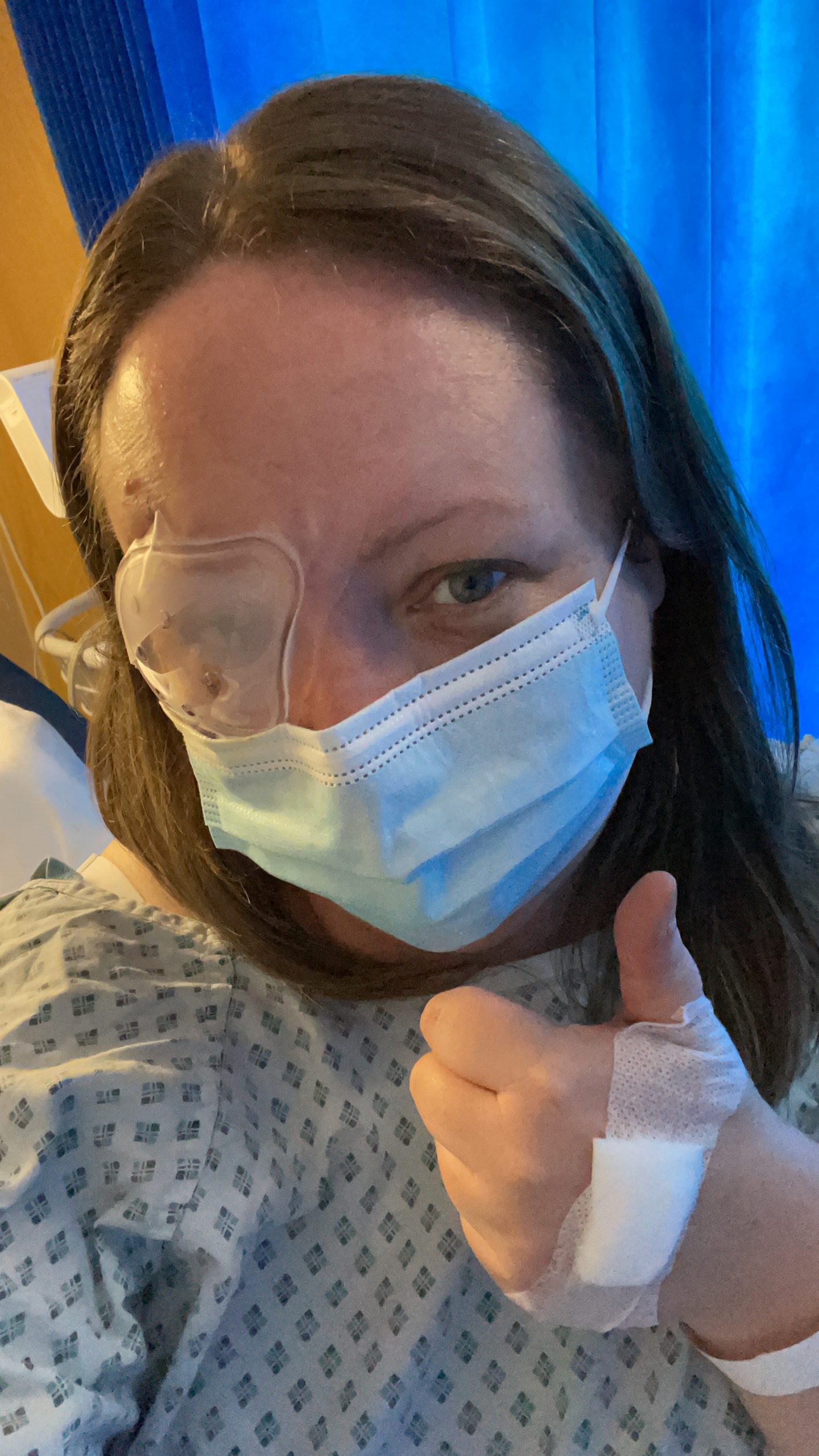
I’m not a doctor, an ophthalmologist, and have no medical experience at all. This is just my personal experience with cataract surgery and the only knowledge I have on this is what my consultant, Ms We Fong Siah, explained during my appointments with her. If you’ve any questions about cataracts, the details of the surgery itself, or any aftercare information, it’s best to speak to your doctor, eye consultant etc.
What were my cataract symptoms?
I always knew there’d be a chance I’d develop cataracts at an early age because my Mam got them when she was in her early 40s. The first things I started noticing was if someone was standing in front of a window, talking to me, there’d be a glare around them. I wouldn’t be able to see their face properly until I covered some of the light to take down the glare. Then I noticed colours of things were dull when I looked at them with just my right eye, compared to looking at it with just my left eye. I found it hard watching tv if the room was dark, as the light on and around the TV would create a halo around the screen.
I found that last year, the severity of the cataract symptoms increased quickly. I’m not sure if more screen time caused it, or if it would have progressed like that anyway. This year, it got to the point where it was affecting my day to day life in a more significant way. Photography is a big part of my job and I wasn’t able to use the viewfinder anymore, relying on the screen instead to take photos. When meeting with friends outside, I’d have to wear sunglasses, even if it was grey because the glare was too much. I found it so uncomfortable trying to film content with a ring light and the worse the cataract got, the more it felt like I was filming facing the sun!
With cataracts, when the light enters the eye, it scatters, rather than having a direct path to the back of the eye. So most light sources would be too bright for me. I had to stop driving at night because when a car would come towards me with their headlights on. Once their light hit my eyes, it would take up the majority of my field of vision. I started having issues with my depth perception, and activities like painting my nails was a messy affair because I couldn’t land the brush on my nail. I could see both brush and nail just fine, but couldn’t tell the distance between them.
Trying to describe what it’s like to see with a cataract is hard. It’s like if you’ve used an oil or cream cleanser on your eye and you haven’t rinsed it out properly. Everything is cloudy. My left eye had to do a lot of the work and when looking at things with both eyes open, I could pretty much see clearly, but there was a light cloud over the right eye. Recently I was changing the brightness on my iPad. And I realised that when the dropdown menu appeared, the screen went blurry and it was exactly what it was like when I closed my left eye and tried to see out of my right eye! So this is a visual representation of what it was like for me. I’d love to be able to show what it was like trying to see at night. Not fun times.
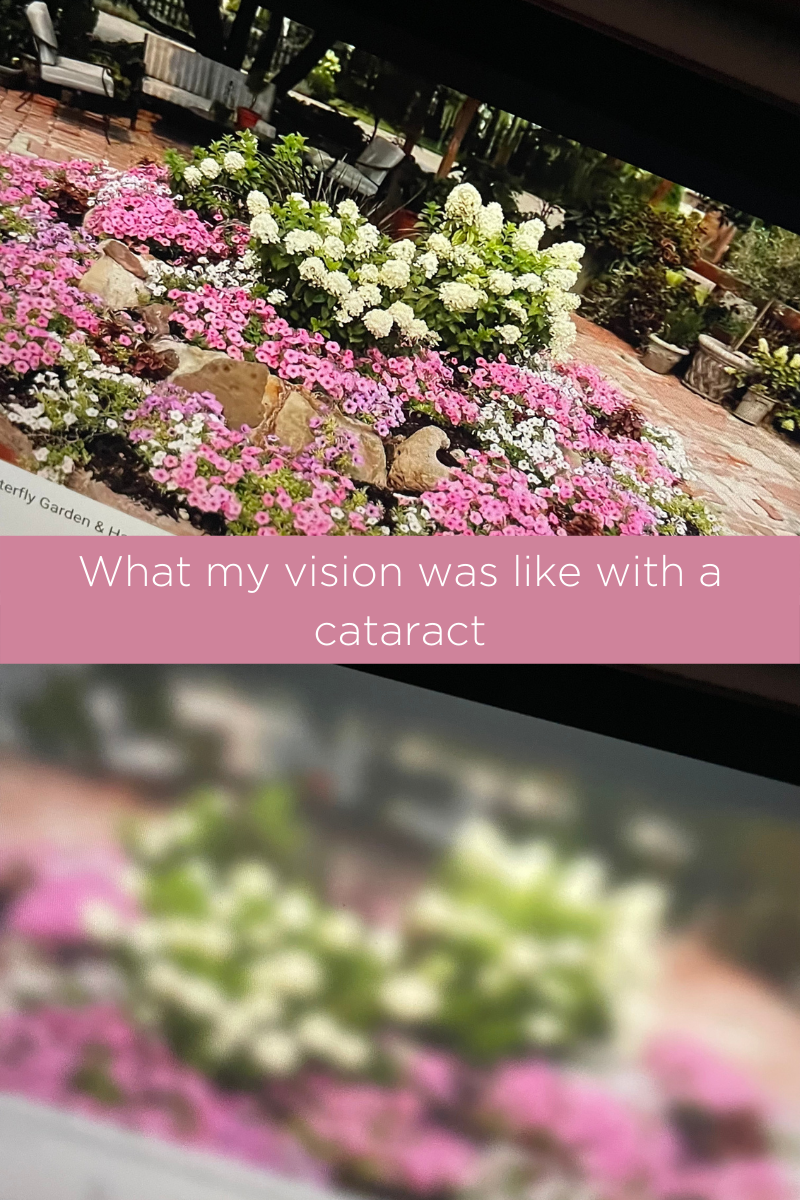
How was my cataract diagnosed?
I had a gifted eye test from Specsavers back in September 2019 (my first ever proper eye test) where I explained what was happening. During the testing process, they could see the start of the cataract. It was minimal then. In March of this year, I went back again for another test and asked them to refer me to a specialist. I’m not sure if this is something that your GP can refer you for, but check it out with them if you’re concerned about cataracts.
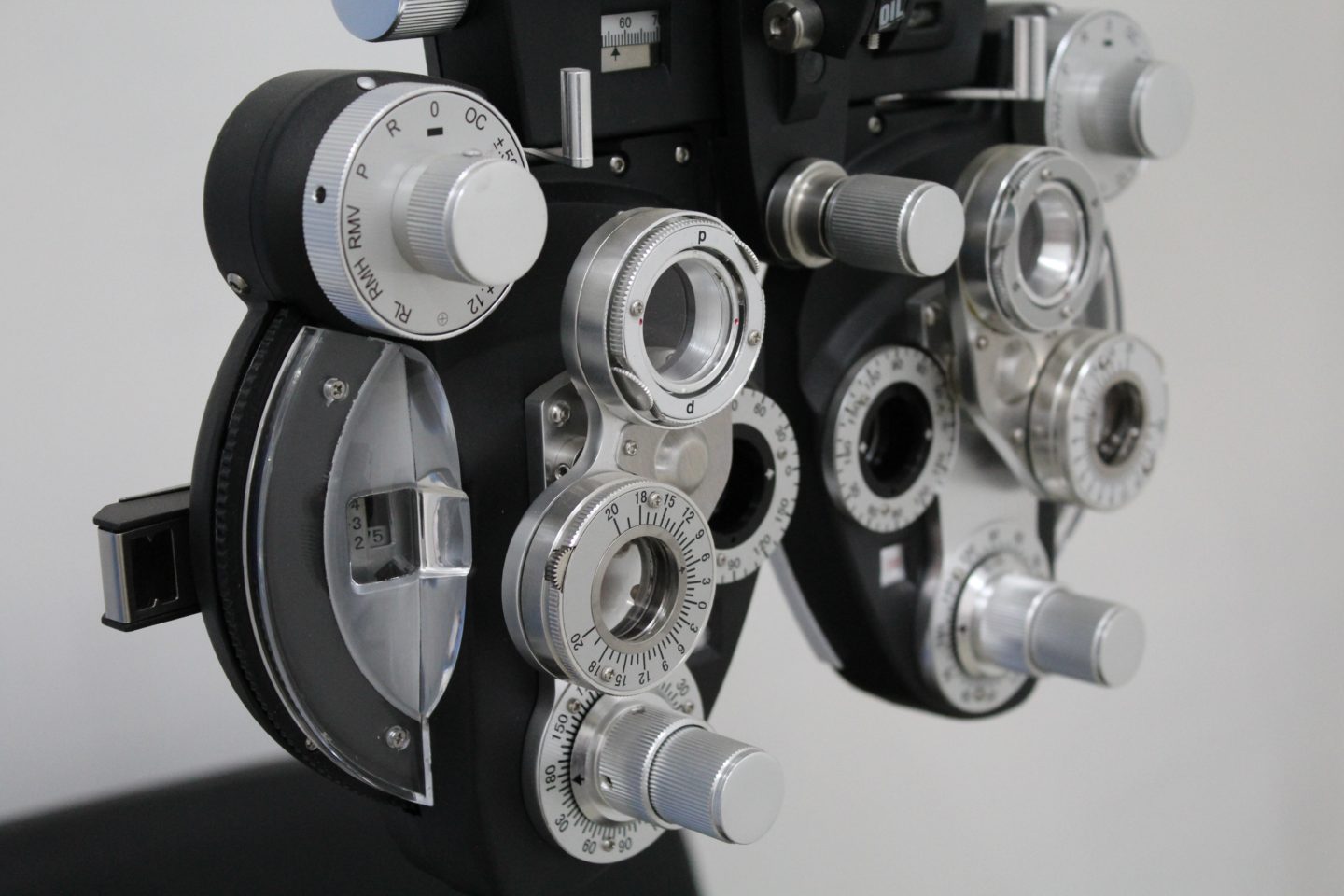
I asked to be referred privately as I needed to get it sorted sooner rather than later. I was referred to Ms We Fong Siah, Consultant Ophthalmic surgeon, in the Mater Private and at the start of July, I had my initial consultation. This involved more tests (I’m not sure what exactly she did, but it involved dilating my eye and numbing it too, which was a very strange experience altogether!). She explained how in surgery, the clouded lens, the cataract, would be removed, and replaced with a new lens. She then detailed the different types of lenses that could be implanted and broke down the costs for me.
More eye tests were done in the lead up to the surgery in the hospital and again, I don’t know the details of what was involved, other than they were going to measure my eye to make sure the lens I wanted would fit the shape of my eyeball. I have slight astigmatism, so they needed to make sure that my lens of choice, the toric lens, would be suitable for me. I remember during one of the tests, the nurse asked me to look at the star, and I said to her “What star?”. She asked me to look with my other eye and I said “Ahh, that star!” She asked how I’d been able to manage with the cataract as it was so thick, she wasn’t able to see the back of my eye. I don’t really know much about eyeballs, but that’s not great!
What happens during cataract surgery?
My cataract surgery experience was straightforward and smooth. The staff in the Mater Private were so lovely. I went to the hospital fasting from the night before. They checked my stats and I walked over to an area close to the theatre, where they marked which eye would be operated on with a little arrow. They asked if I wanted sedation, but I was surprisingly calm all morning! For those who know me, I am extremely squeamish when it comes to anything to do with eyes or nails. But I kept saying to myself, I’m going to be able to see again, I have trust in my consultant, this is mad, but be grand. That was my mantra!
The anaesthetist suggested putting in a cannula anyway in case I decided I wanted to be sedated during the procedure. I asked him what it would feel like and he advised I’d feel a bit dizzy or tipsy and it would last 15-20 minutes. After trying to find a vein twice (which was the most painful thing of the day) I said to him “Ok, no sedation!”
They stuck those stickers onto my chest and hooked me up to a machine in the theatre and I had a blood pressure monitor cuff on my arm too, which went off maybe 3 or 4 times during the procedure. I think I had one of those pulse oximeters on during the procedure too, I can’t fully remember. The procedure was done under local anaesthetics in the form of numbing eye drops.
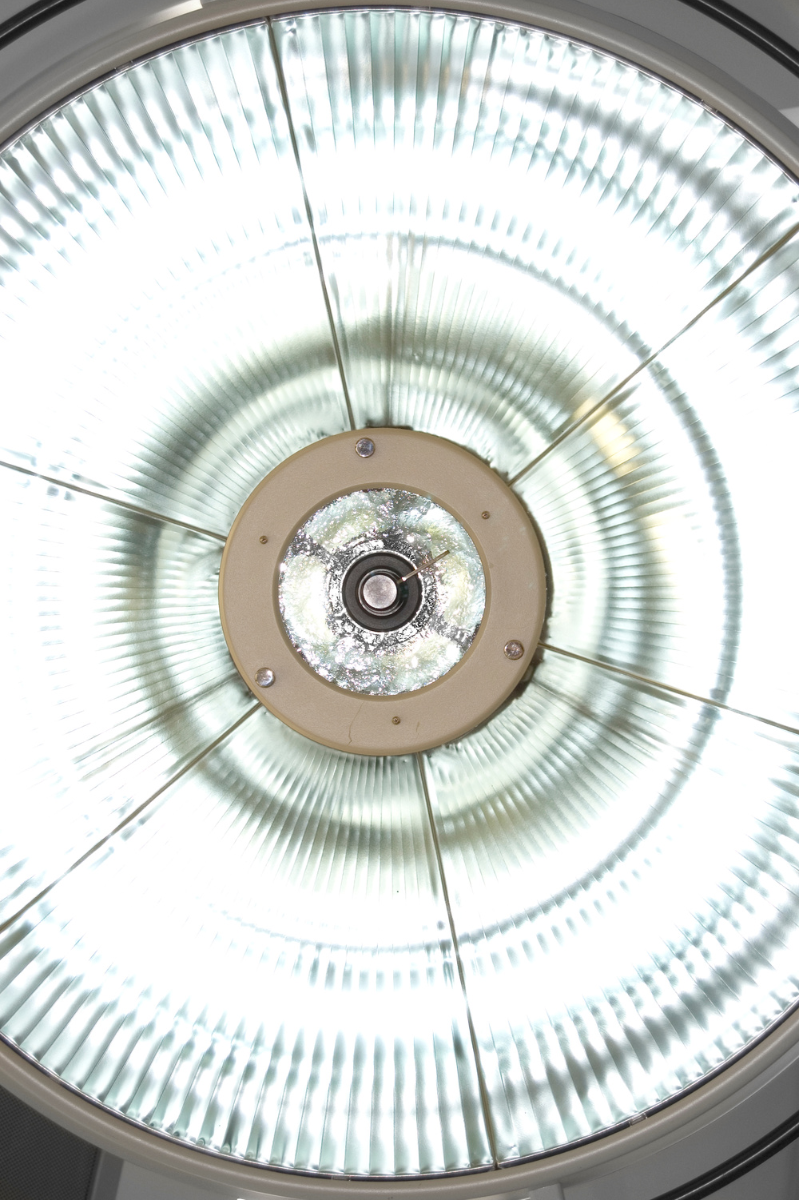
Image from Canva
In the operating theatre Ms Siah put a plastic sheet over my whole face, which was sticky underneath. My plan was to keep my left eye closed during the procedure anyway, so this took away the temptation to look! She stuck my top lashes to the pad and then inserted a clamp to keep the eye open for the procedure. This didn’t hurt at all and it wasn’t uncomfortable. She said that during the procedure, she’d be adding water drops to my eye every so often.
I had to look at an overhead light throughout the 20-25 minute procedure and I couldn’t see anything else other than that light. There was no sign of any instruments or anything and that was one of my biggest fears beforehand. I had no pain whatsoever, so I couldn’t see or feel anything.
One way of removing a cataract is to use a laser to break it down, but my surgery involved removing the cloudy lens and replacing it with a new one. I’d chosen a toric lens after being given all of the information by Ms Siah and felt that it was the best one for me and my needs.
During the procedure, I lay there looking at the light, apart from when the new lens was being inserted. At least I think that’s when this happened. Everything went black for a couple of seconds, but when the new lens moved into the right position, I could see more light, almost light a prism. It was like looking down a kaleidoscope and I remember thinking how gorgeous it was!
And that was it. I had no pain and couldn’t see anything during the procedure other than the light and the water when it was dropped onto my eye.
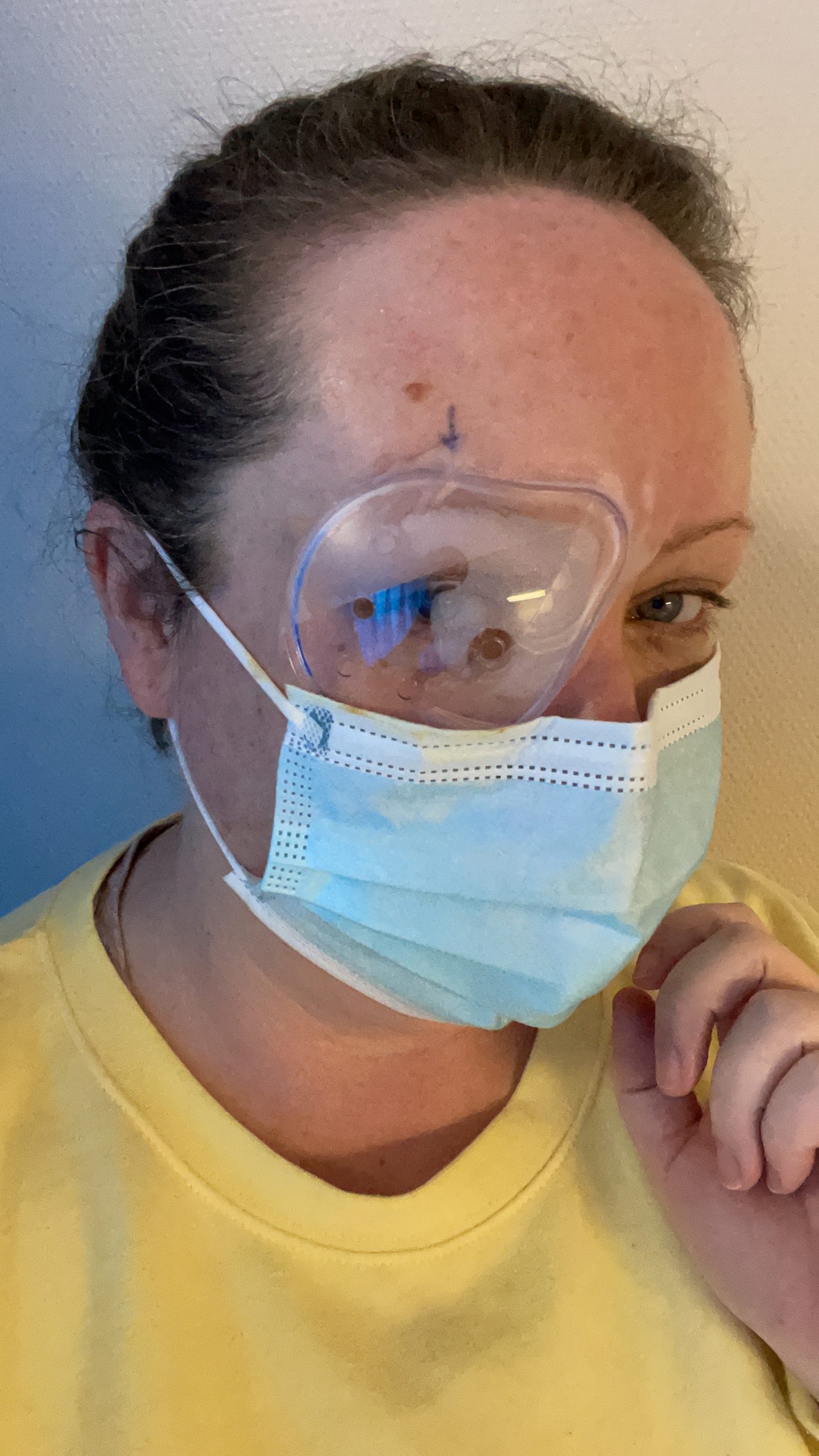
What happens after cataract surgery?
The team stuck a plastic shield over my eye right after the surgery, instructing me not to remove it until the following morning. Gals, my experience after cataract surgery is that I instantly saw results because when I was wheeled back to the recovery room, I noticed something magical. There was a light fixture right above my head on the ceiling and when I closed my left eye, my good eye, I could see the details in it. It wasn’t a big soft, white blur! I spent the next hour or so looking at everything with my right eye through the plastic shield, marvelling in the instant difference!
My eye had been dilated for the procedure, and it was still dilated when I was going to bed that night. Because it was a really sunny day, it meant that I spent the day with the blinds closed as my eye was really sensitive. That night, a couple of hours before bed time, my eye started to feel gritty and a bit sore, so I applied my eye drops and went to bed. I woke up the following morning with no dilatation and no gritty feeling at all.
They gave me three sets of eye drops to use four times a day. I won’t go into which specific drops in case yours are different to mine. Two have to be taken four times a day for two weeks and one needs to be taken four times a day for a month.
I was given a list of dos and donts following the procedure, which included not being allowed to bend over, or get water in my eye for the first week. It also advised not to undertake work or sports for a week and not to rub my eye at all. I’ve to wear the plastic shield every night for a week, and longer if I felt I needed to.
What next?
I’m less than a week post cataract surgery and my eye is slowly healing. In my initial consultation, Ms Siah mentioned that during the procedure, she’d be polishing the back of my eye, but that I might need laser afterwards. And after the surgery, she confirmed that I would need laser, as she’d polished it as much as she could.
The day following surgery, when I took the plastic shield off, I was instantly taken aback by how bright everything was and how vivid the colours where! I remember going out to the back garden and asking myself if the grass was always that green. I think I’d grown so used to having everything dull and having a cloudy film over it! Whereas I’d usually only need to wear my glasses if on the computer, I’ve been wearing them watching the TV just because it’s so bright and vivid and they help my eyes relax a bit.
Sleeping with the plastic shield on isn’t too bad at all. I’ll probably continue doing that until my follow up consultation next week, just to be on the safe side.
Six days post procedure and I still have some flickering at the bottom right corner of my eye, mainly when I look around. That will hopefully settle and it’s not something that’s too annoying. I can see things about 90% clearer with my right eye now and I can even read words! This hasn’t happened in I don’t know how long! When typing on the laptop or looking at my phone for too long, I have slight double vision. But at less than a week after having the cataract removed, the difference is unreal.
In that initial consultation back in July, she also mentioned that she could see the start of another cataract in my left eye. It’s not something I’d noticed, but after the procedure, I’m so much more aware of it. I can already start to see that familiar glare when I’m looking at a screen or a bright light. It’s nowhere near what the other eye was like, but it’s something I want to take care of before it gets too bad.
If you have cataract surgery coming up, or if you think you have a cataract and are nervous about the procedure, I hope this helped and put your mind at ease a bit. As I said at the start, this was my experience with cataract surgery and I’ve tried to give as much detail as I can so that you have an idea of what might be ahead of you. Your Consultant Ophthalmic surgeon will be able to answer all of the medical related questions and take care of that side! I’ll update this post when I have my follow up consultation on Friday and will no doubt come back and read this again when I’m ready for the other eye to be done!
